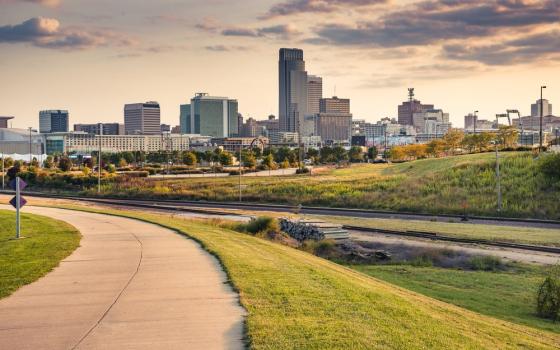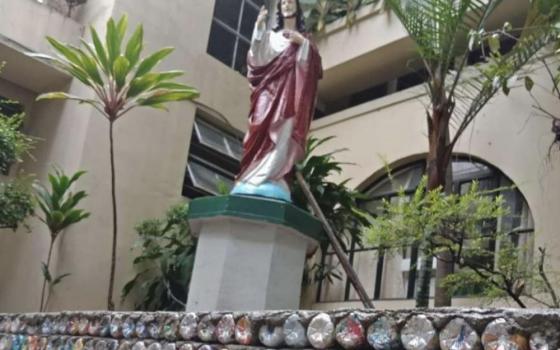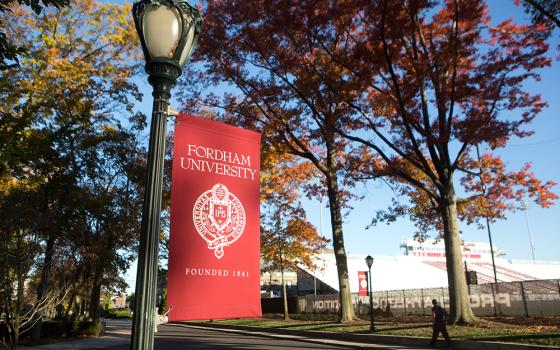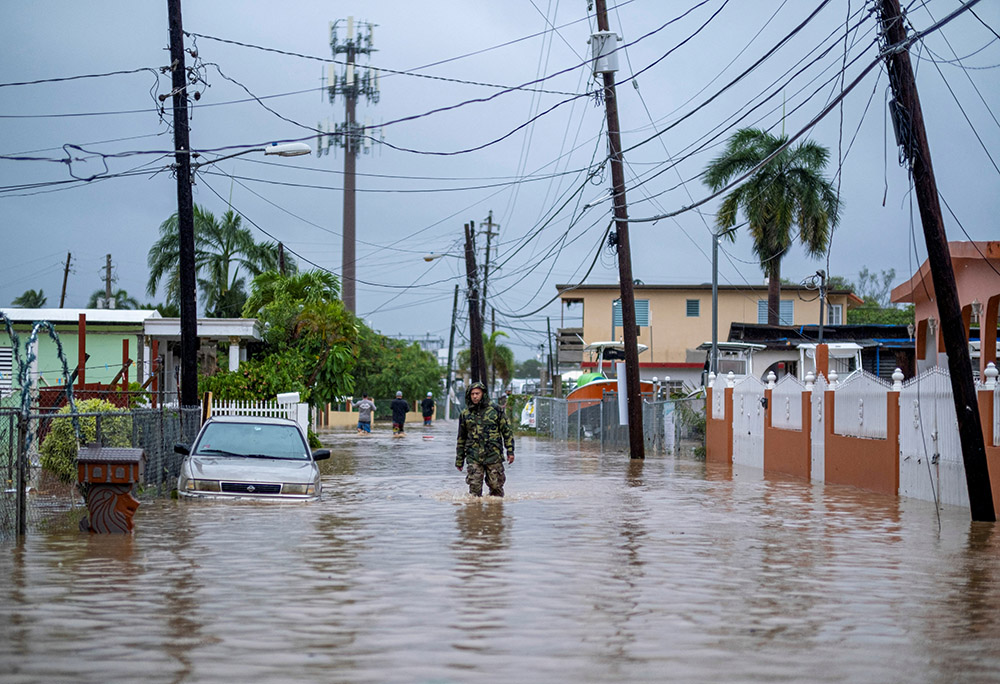
A member of the Puerto Rico National Guard wades through water Sept. 19, 2022, in search for people to be rescued from flooded streets in the aftermath of Hurricane Fiona in Salinas, Puerto Rico. (CNS/Ricardo Arduengo)
Editor's note: EarthBeat is publishing a series of essays on the goals of the Laudato Si' Action Platform from speakers at the 2023 "Laudato Si' and the U.S. Catholic Church" conference, held virtually throughout June and July and co-sponsored by Creighton University and Catholic Climate Covenant. This essay is on the Laudato Si' Goal "Response to the cry of the Earth."
When someone cries for help, usually we go to that person and ask, "What is wrong? Are you okay?" We spend time listening to their concerns, situation or plea, tend to their needs, call emergency personnel or even pray. This response embodies the Catholic directive to love your neighbor as yourself (Matthew 22:39).
Today, Mother Earth is crying for help. As a climate scientist, I hear this cry through my research in the Caribbean assessing future changes in rainfall, an important commodity for farmers, water managers and other inhabitants in the region. Consequently, it is one of the most vulnerable regions to climate change impacts due to losses in biodiversity from warmer temperatures, and increases in flash flooding, droughts and hurricane activity.
I have witnessed the devastating impacts — my own family in Puerto Rico experienced 135 days without power following Hurricane Maria.
My Catholic faith tradition instills a deep sense of care and responsibility for the world. Furthermore, Catholic social teaching fosters a deep understanding of the interconnectedness of all life and promotes responsible actions for the care of our common home.
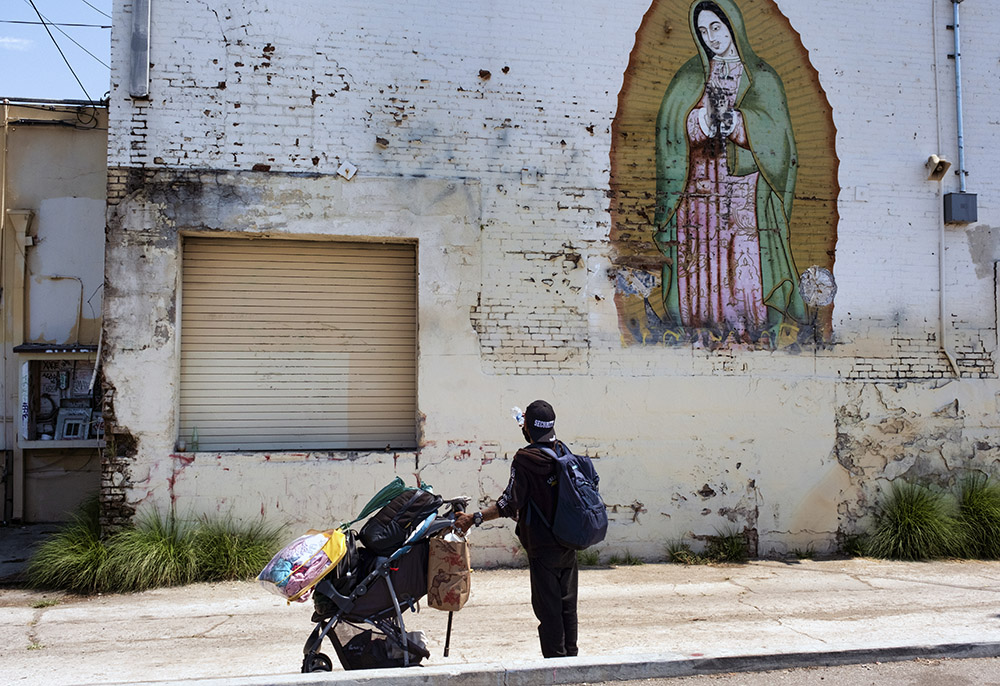
Henry Zeller, a homeless man who lives out of an RV on the street, stops to drink water to stay hydrated during the extreme heat in Los Angeles July 16. (AP/Richard Vogel)
In recent weeks, the planet has experienced its hottest days ever recorded. Last year, reports from the United Nations Intergovernmental Panel on Climate Change warned of heat waves, floods and droughts becoming more frequent and intense than in the past. We see these consequences of climate change reverberating throughout the United States, across diverse regions, directly impacting the local ecosystems and communities that rely on them.
In the Western United States, scorching heat waves and drought have resulted in major concerns regarding water security.
The Great Plains, where 80% of the area is used for agriculture, faces the challenge of heat waves and drought that increase soil erosion and decline water resources, impacting crop yields and food production.
The northern United States has experienced a lengthened pollen season and a warmer, wetter climate that extends suitable habitats for disease-carrying ticks, mosquitoes and other insects.
Coastal communities, including Puerto Rico and Hawaii, face erosion from sea-level rise. Meanwhile, intense hurricanes and increased coral bleaching threaten marine wildlife.
In Alaska's fishing communities, melting permafrost and sea ice depletion diminish natural resources.
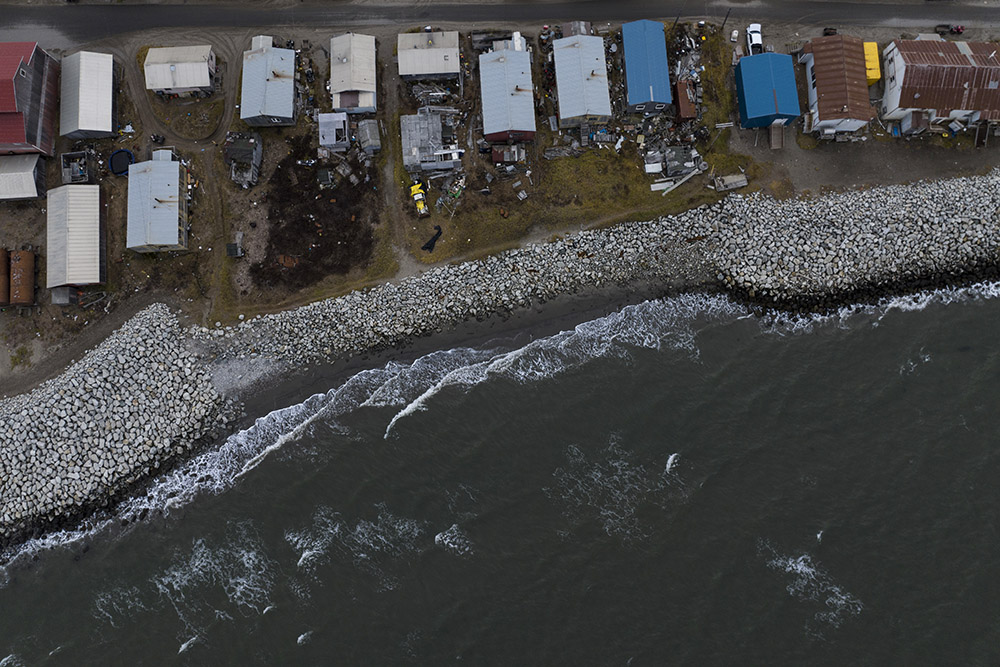
Small waves crash into reinforced seawalls on Oct. 4, 2022, in Shishmaref, Alaska, where the island Inupiat community faces rising sea levels, flooding, increased erosion and loss of protective sea ice and land. (AP/Jae C. Hong)
The Earth's cry is heard beyond the realms of modern science and the Catholic faith, too. Indigenous knowledge holders hear it through the devastating impacts extreme weather and climate change have on their sacred lands. Whether you live in a mountainous region seeing less snow than before, an area where wildfire season has lengthened, or a coastal town witnessing polluted waters, your experiences with the local environment can provide a deep sensitivity to Mother Earth's cry, if you're listening.
In the face of such expansive environmental crises, we must respond with urgency and unity. This response requires the collaboration of communities from all faiths, belief systems, and backgrounds, because the care of our common home requires cooperation with everyone.
That's why I developed and now lead the American Meteorological Society's Committee on Spirituality, Multifaith Outreach, and Science (COSMOS), which brings together scientists, faith leaders, government agencies and Indigenous knowledge holders to promote a multidimensional approach to environmental stewardship.
Through partnering with faith organizations and the U.S. National Weather Service in its Weather-Ready Nation program, COSMOS provides educational and material assistance to faith organizations in becoming weather- and climate-ready hubs with increased preparedness for natural disasters. For example, COSMOS helps houses of worship connect with local weather service personnel, receive weather radios, and train congregations to prepare and properly respond to hurricanes, tornadoes, wildfires or other weather extremes.
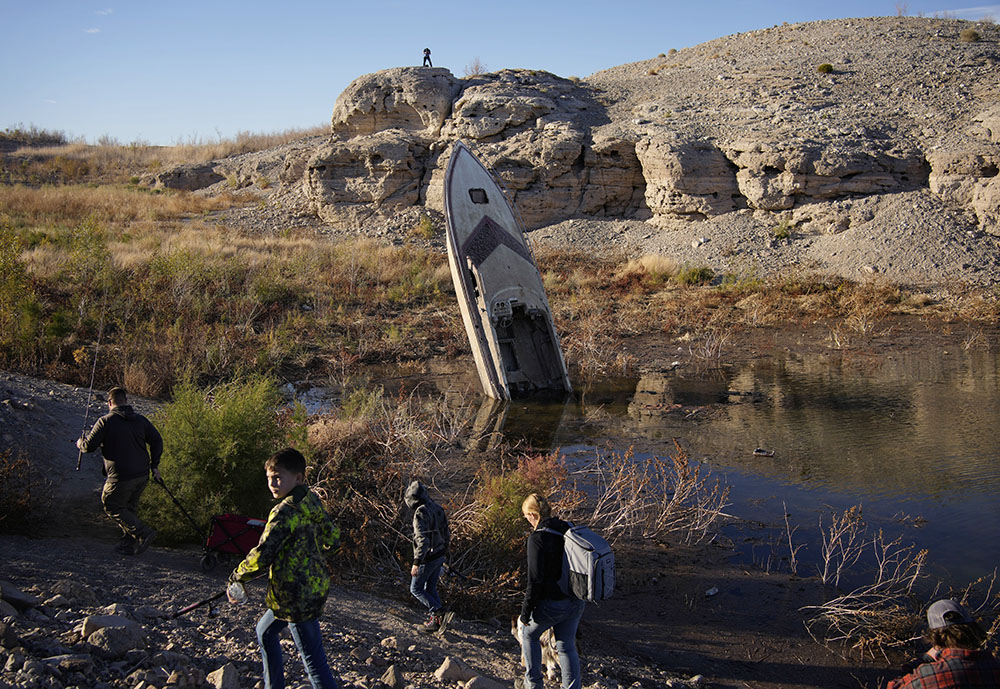
People walk by a formerly sunken boat standing upright into the air with its stern buried in the mud along the shoreline of the drought-stricken Lake Mead at the Lake Mead National Recreation Area on Jan. 27 near Boulder City, Nevada. (AP/John Locher, File)
Additionally, COSMOS develops sessions, initiatives, webinars and other programming on community climate mitigation and resilience and environmental justice, and public communication on environmentalism.
For example, COSMOS' publicly available "Finding Common Ground Amongst Science, Spirituality, and Environmentalism" webinar series brings together spiritual leaders of all backgrounds to converse with weather, water and climate professionals.
We also developed the first-ever town hall and presidential session on Indigenous and Earth system science at the 2023 American Meteorological Society annual meeting, where Indigenous leaders highlighted the value of Indigenous voices in the weather, water and climate community, and discussed ways to partner on environmentalism.
The Catholic Climate Covenant and the Laudato Si' Movement are among those faith organizations that COSMOS has partnered with in their mission to address the climate crisis, biodiversity loss and ecological sustainability. COSMOS provided scientific literature and expertise in the development of the Catholic Climate Covenant's Wholemakers creation care curriculum for young adults.
Advertisement
We have also partnered with multifaith organizations such as GreenFaith and Interfaith Power and Light to develop community gathering events between their affiliates and professionals in the weather, water and climate community to promote relationships and community-centered environmental projects.
Working in tandem with the U.S. Centers for Faith-based and Neighborhood Partnerships, COSMOS has linked even more faith-based and spiritual partners. By connecting more groups in this space, we streamline funding resources, grants and federal initiatives that support houses of worship in their transitions to become more environmentally friendly.
The cry of the Earth is both a call for help and a call to action. The scientific evidence of climate change impacts leaves no room for complacency; God entrusts us with the responsibility to be stewards of creation. Just as we are called to respond to human cries for help, so too must we respond to the cry of the Earth with love, compassion and action. As Catholics, we are called to be caretakers of God's creation, recognizing that our response to the cry of the Earth is rooted in our faith and in our shared humanity.
Then, by fostering interdisciplinary and multifaith collaboration, we can amplify our efforts to protect and restore the Earth. Through sustainable practices, conservation initiatives, and political advocacy that prioritizes the well-being of both people and the planet, we become agents of change. And in doing so, we can bring hope to the world and ensure a sustainable and thriving planet for future generations.




